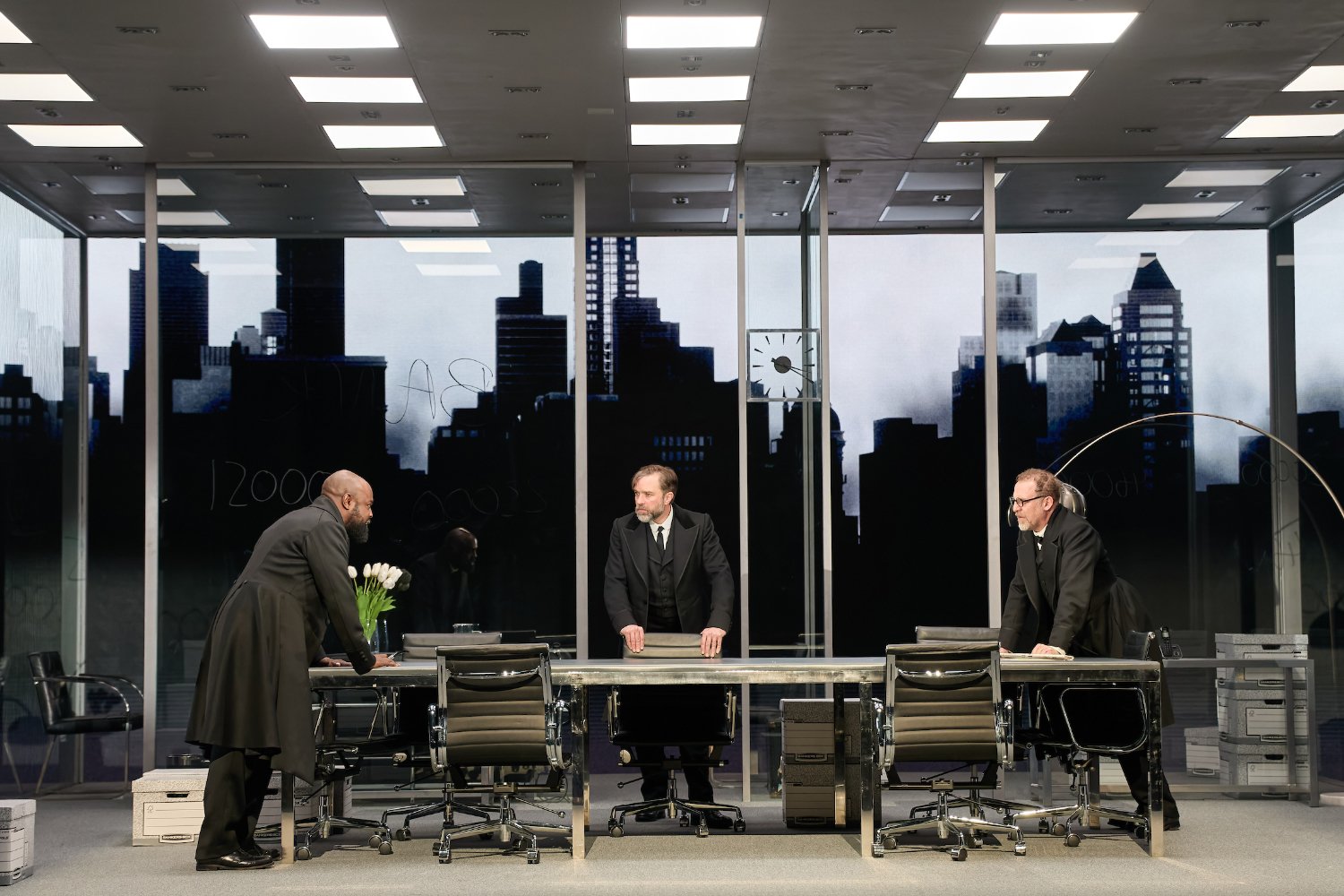Sam Mendes’ stylistically pared down but emotionally ramped up blockbuster returns triumphantly to the West End
Director Sam Mendes' electrifying family epic The Lehman Trilogy opens on a spare set of glass, steel and designer furniture. It’s so bright and sparklingly modern you almost need shades. Yet this pristine office scene, created on a revolving stage by set designer extraordinaire Es Devlin, is the ever-present backdrop to a story that begins in 1844 with Hayum Lehmann stepping off a boat as he arrives in New York from Rimpar, Bavaria. He passes through immigration and emerges, reborn – after a brush with an impatient official – as Henry Lehman. So begins a rollercoaster of a ride that takes us from the Lehman brothers first enterprise, a small general store in Montgomery, Alabama, to the glittering 21st-century edifice of the company’s global headquarters in midtown Manhattan.
In Alabama, Henry is soon joined by his younger brothers Emanuel and Mayer. They found a cotton merchant enterprise that mutates into an investment bank. The family business is handed down the generations until it’s taken over by Bobby, son of Emanuel, who runs the company until his death in 1969. It's then taken on by outside successors. This simple premise encompasses a story of great complexity: of immigrant aspiration, the history of modern America and ultimately the story of capitalism itself. It marks the moment when the imperative to “buy” because you “need” something is overtaken by the urge to buy because the act of buying gives meaning to your life. It spotlights the transformation of money as the byproduct of selling commodities, such as cotton, coffee and steel, to becoming the product itself: “…the key ingredient, the flour. Money makes money.”
But this is no plodding economics lesson. Time hurtles by in the hands of the astonishing trio – Nigel Lindsay, Michael Balogun and Hadley Fraser – who play the brothers. The actors take on the legion of other parts too, shape-shifting seamlessly from demure southern belles to testy toddlers, and never missing a beat in the breakneck delivery of playwright Stefano Massini’s startling prose. There’s also vaudeville humour, admittedly much of it as the men take on women’s parts, but the laughs never feel at the expense of the female characters.
While history whirls on, beautifully encapsulated by Luke Halls’ monochrome projections of a changing New York skyline, little of the seismic changes outside impact on the brothers, who seem almost hermetically sealed off inside their offices. Slavery, the Civil War, world wars, the atomic bomb – all are simply vehicles for expanding, adapting and offering more opportunities for the way that money can be made. The devastating effects of 1929’s Wall Street Crash on the outside world are brushed off in a few sentences – the brothers’ main concern is that other banks should fail first, leaving the government pressurised to finally step in to save them. The irony is not lost that in the 2008 crash, it was Lehman Brothers that was let go. On the morning of that crisis we see the news drip in of traders who have taken their own lives rather than face financial ruin. The stories of the millions who lost their homes and livelihoods across the world doesn’t raise even a flicker of a mention.
This sequence perfectly captures a truth at the heart of this fiercely intelligent and extraordinary production: ultimately the pursuit of profit above all else is a deeply dehumanising force. The mess that the world got into in 2008 happened, in part, because those who took financial risks were insulated for so long from the impact their actions had on the world outside 'the markets' – and none more so than the Lehmans.
By Rebecca Taylor
Photos by Mark Douet
The Lehman Trilogy runs until Saturday 20 May. 7pm, 1pm (Sat only). £10-£150. Gillian Lynne Theatre, WC2B 5PW. thelehmantrilogy.com
Listen to our podcast about the 2018 production of The Lehman Trilogy on JR OutLoud.




